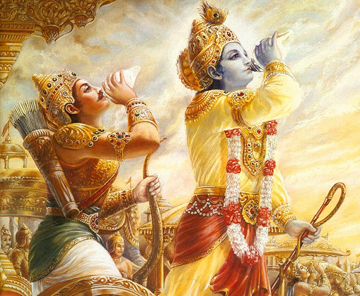 My first direct encounter with the Bhagavad Gita was in the parking lot of the Methodist church in Montgomery City, the small Missouri town where I spent most of my growing up years. I was in the church parking lot because a flea market was being held there.
My first direct encounter with the Bhagavad Gita was in the parking lot of the Methodist church in Montgomery City, the small Missouri town where I spent most of my growing up years. I was in the church parking lot because a flea market was being held there.
I had gone with my grandmother there to sell her handmade arts and crafts and buy some comics.
The Bhagavad Gita was also very much on my mind. My father had died two years previously – after a long, painful ordeal – and I had consequently undertaken a search for answers to the deep questions of life: Why is there so much suffering? What is the purpose of this life? And what happens after we die?
The Bhagavad Gita, however, was not easy to come by in Montgomery City, so I was not sure when I would get to read this wise and ancient book.
But on that spring day in 1983, something happened that changed the course of my life. Seeing a flea market table that looked like a promising place to find books, I saw the Bhagavad Gita sitting on top of a pile of old magazines. It was the richly illustrated Bhagavad Gita: As It Is, the Gita as translated by A.C. Bhaktivedanta Swami Prabhupada.
I opened the text, seemingly at random, to one of the illustrated plates – a portrait of a man who had died and was surrounded by his grieving family. The picture hit me like a lightning bolt, as it seemed to sum up perfectly the experiences of my family over the past couple of years.
Standing at some distance from this grieving family was a wise Hindu sage, gazing upon them with a serene, compassionate detachment, and gifted with the ability to see the divinity within each family member (illustrated by a small image of Lord Krishna floating over each person’s heart). Beneath this picture was a caption that read, “The wise lament neither for the living nor the dead,” with a page number given.
Reading these words, I felt as if I was hearing the voice of God speaking directly to me in this Methodist church parking lot.
I looked up the page reference indicated next to the caption and came to the eleventh verse of the second chapter of the text: “Those who are wise lament neither for the living nor the dead.
Never was there a time when I did not exist, nor you, nor all these kings; nor in the future shall any of us cease to be. As the embodied soul continually passes, in this body, from boyhood to youth, and then to old age, the soul similarly passes into another body at death. The self-realized soul is not bewildered by such a change.”
I cannot begin to describe the power these words had for me that day, a power that resonates to this day. Transfixed, I could not put the book down. Here was the wisdom I was seeking. Here were answers that actually made sense, both logically and intuitively.
Gita Jayanti is observed on December 13 every year to commemorate the day when Lord Krishna rendered his philosophical teachings to prince Arjuna on the first day of the 18-day battle of Kurukshetra.
Jeffery D. Long






